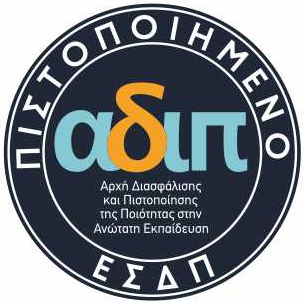Quality Assurance

Quality Assurance at the Athens School of Fine Arts (ASFA)
Statement
The provision of high-quality higher education and the enhancement and improvement of the research output of the Academic Departments constitute a primary concern and a strategic choice of governance and responsibility for the Athens School of Fine Arts (hereinafter “ASFA”), to which both its leadership and its entire staff are fully committed.
ASFA has developed and implements a specific formal Quality Assurance Policy, which forms an integral part of its strategic planning. This policy established the guiding principles for the operation of the Internal Quality Assurance System, with a focus on the continuous improvement of all functions and activities of ASFA and its accountability obligation.
ASFA’s Quality Assurance Policy
ASFA’s Quality Assurance Policy safeguards – through the Quality Assurance Unit (MODIP) – the development of a quality-oriented approach within the institution. This enables all internal stakeholders (e.g. governing bodies, faculty members, teaching and research staff, administrative staff, students of all academic programmes, and other interested parties) to actively participate in the further development and implementation of this policy.
ASFA’s Quality Assurance Policy and the strategy for its implementation are carried out through MODIP, a formal institutional structure established on 28 May 2009 (Senate Decision of 28.5.2009, Item 3), and in accordance with the decisions of the General Assemblies of the Academic Departments regarding the establishment of Internal Evaluation Groups (OMEA), for the organisation, coordination, and implementation of Evaluation and Quality Assurance procedures, in full alignment with the requirements of the legal framework in force (Law 3374/2005).
By decision of the ASFA Senate (meeting of 6 June 2018), the proposal submitted by MODIP (meeting of 1 June 2018) concerning the organisation, structure, and operation of both MODIP and the Internal Quality Assurance System (IQAS) of ASFA was approved (Government Gazette 2841/B’/2018).
ASFA’s academic and administrative staff are regularly informed of the evaluation procedures as defined by current legislation and actively participate in their implementation. The OMEA units of the Academic Departments process input data and draft the Departments’ Internal Evaluation Reports, laying the groundwork for the External Evaluation process. Administrative staff submit relevant data to MODIP (e.g., financial information, human resources figures, infrastructure, etc.) related to the operation of ASFA.
MODIP – as the body in charge – developed and implements the Internal Quality Assurance System, which includes specific principles, criteria, regulations, and defines procedures aimed at the ongoing improvement of all ASFA institutional operations and activities.
ASFA’s Internal Quality Assurance System was developed in line with international standards, particularly those of the European Higher Education Area (EHEA), and the principles and guidelines of the Hellenic Authority for Quality Assurance in Higher Education (ADIP). Its primary objective is to ensure the high-quality operation of all ASFA functions and activities, the continuous improvement of the educational and research output, and the effective performance of its services.
To safeguard and continuously enhance the quality of scientific, educational, and artistic/research output, as well as to ensure the effective functioning and efficiency of its services, ASFA complies with the quality criteria defined by applicable legislation.
The Quality Assurance and Improvement Policy is specified across ASFA’s areas of activity, and its core strategic pillars are as follows:
1. Continuous reform and improvement of ASFA’s academic programmes
2. Enhancement of student-oriented learning in the design and development of programmes
3. Improvement in ASFA students’ performance and academic success
4. Reduction of dropout and late completion rates
5. Strengthening of the artistic, theoretical, and research work within the Academic Departments
6. Increased international visibility of artistic production in the visual arts
7. Expansion of impactful artistic activities at the local, regional, and international levels
8. Continuous improvement of working conditions for academic, research, and administrative staff
9. Resolution of infrastructure-related issues
10. Development of synergies among ASFA’s Academic Departments, particularly in undergraduate and postgraduate programmes
11. Strengthening of international relations and cross-border cooperation programmes involving student, faculty, and staff mobility
12. Expansion of collaborations with domestic and international institutions, and dissemination and enhancement of visual arts projects and research, as well as the improvement of visual artistic and research output
13. Promotion of the outward orientation of ASFA’s Academic Departments
14. Recruitment of highly qualified faculty from Greece and abroad
15. Resolution of issues in the implementation of administrative tasks
16. Application of sustainable development measures to reduce the environmental footprint caused by the institution’s operation
17. Creation of new postgraduate programmes, particularly of interdisciplinary and interinstitutional nature
18. Utilization of alternative funding sources (e.g., participation in international programmes, self-funded courses, sponsorships, donations)
19. Improvement in the organisation and delivery of other educational programmes (e.g., Lifelong Learning) or seminars, and other self-financed courses
20. Continuous planning and implementation of activities to support vulnerable social groups directly or indirectly
21. Leveraging the alumni network to support ASFA’s academic and social objectives
The aforementioned Quality Assurance Policy, whose core pillars are detailed above, supports: (a) organisation of the Internal Quality Assurance System, (b) assumption of responsibilities by leadership and internal stakeholders (e.g. governance bodies, faculty, teaching/research staff, administrative staff, students of all academic programmes, and other interested parties), (c) safeguarding of academic principles, ethical standards, and equity, (d) assurance of quality across all academic programmes of ASFA’s Departments in line with ADIP standards, (e) qualitative and effective organisation of administrative services and infrastructure development, (f) appropriate allocation and effective management of resources necessary for ASFA’s operation, and (g) rational distribution and enhancement of human resources in both educational and administrative areas.
